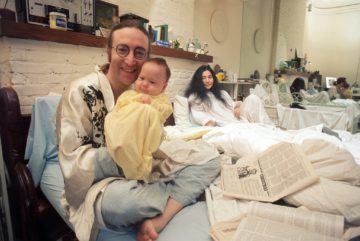Barbara Graustark in The New York Times:
 Could there possibly be an upside to the long, stressful periods of isolation that so many people have endured during the pandemic lockdown of 2020? When we emerge, will we see the world in a new way? Could there even be a silver lining to these months of quiet living and self-reflection?
Could there possibly be an upside to the long, stressful periods of isolation that so many people have endured during the pandemic lockdown of 2020? When we emerge, will we see the world in a new way? Could there even be a silver lining to these months of quiet living and self-reflection?
Four decades ago, I heard firsthand how a long period of solitude changed an extraordinary figure who was determined to make his life have meaning: John Lennon, who is being mourned by millions on Tuesday, the 40th anniversary of his murder. There was no pandemic in late 1975 when Lennon and Yoko Ono, the most public of personalities, withdrew for what became a five-year hiatus from interviews and recording following the birth of their son, Sean. But for Lennon there was plenty of existential angst, and actual fear.
He was living in New York City, still seeking a green card and fighting deportation. Though the Beatles had stopped making music, it would take years to dissolve legal ties, and the band’s shadow enveloped his life. Collections of classic Beatles songs were recycling the Fab Four’s greatest hits, leaving Lennon to worry if he could ever live up to the public demand that the Dream Band reunite. Paul McCartney soared up the charts with Wings, but Lennon hadn’t had a No. 1 album since “Walls and Bridges” in 1974, with Elton John’s assist on “Whatever Gets You Thru the Night.”
More here.
